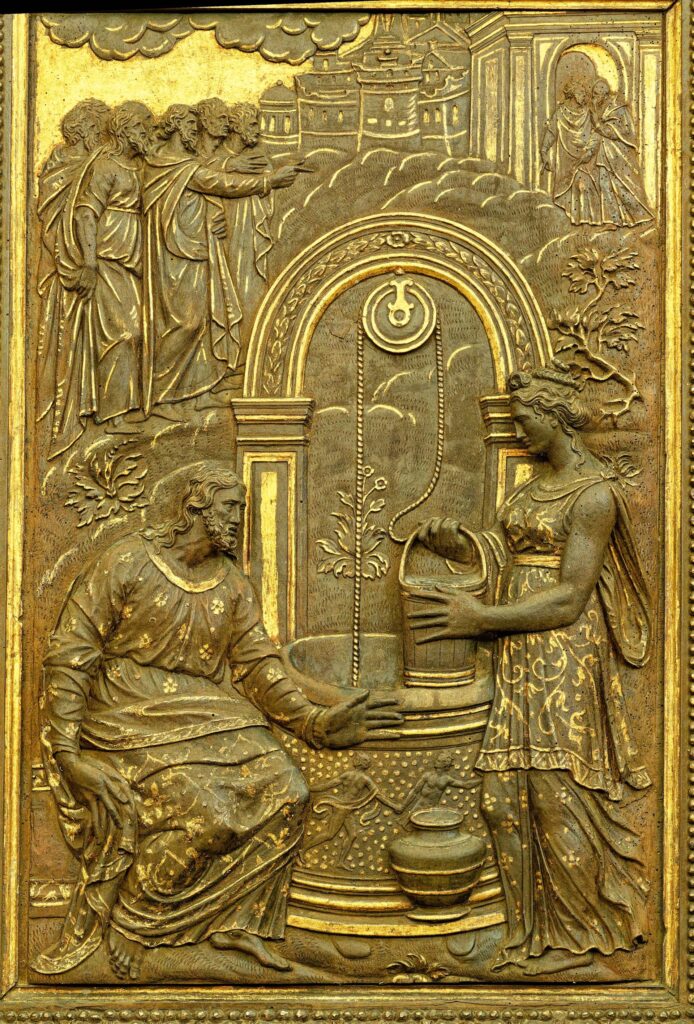JESUS TALKS TO THE WOMEN
by Kristen West McGuire
It is hard for us to understand how radical Jesus was during his life on earth. Men and women mingle all the time in our culture, in homes, offices, and churches. Women in our culture are not restricted to their homes, and are not required to veil their faces. So, when Pope John Paul II spends an entire chapter of Mulieris Dignitatem looking at Jesus’ interactions with women, it almost seems patronizing. “Look, some of his best friends were women!”
Well, sure, Jesus did have some interesting encounters with women in the gospels. In fact, he told them personally he was the Messiah! But let’s not get ahead of ourselves here. Jesus was radical in his relationships with everyone. And his interactions changed the whole world.
What were the rules back then? A man did not speak publicly with a woman in Jewish society, not even his wife. So, for Jesus to address any woman in public was always a departure from societal norms. Whether he is talking to a young woman at the well, entering sick rooms to heal, or even talking with his mother at a wedding about the quantity of wine, we see Jesus in a new light based on the rules he broke.
The daily prayers of Jewish men included this prayer of thanksgiving: “Praised be God that he has not created me a woman.” As in most ancient cultures, girls were the legal responsibility of their fathers, and wives ‘belonged’ to their husbands. But the Jews believed women were more than mere property. Women were to be protected. Deuteronomy 22 outlines the many punishments for sexual sin. They taught that a seducer must marry the virgin he defiled. And adulterers should be stoned.
Widows and orphans had no protectors. Only the Jews in the ancient world encouraged the practice of communal caring for these defenseless ones. Note that multiple prophets accused Israel of indifference to this responsibility. (Isaiah 1:23, 10:2; Jeremiah 7:3-7, Hosea 14:3, Malachi 3:5, etc.)
In addition, there was a strong cultural emphasis on avoiding those who were ‘unclean.’ The sick, the lame, and especially the sinners of society were seen as unclean. Again and again, Jesus not only defended the outcast, but interacted with them. He scandalized his peers by daring to go among the unclean.
In fact, as word spreads of this man who could be the Messiah, gossip also included his rule-breaking. He was hanging out with the wrong crowds. No wonder people were confused.
The story of the woman at the well (John 4:7-27) highlights Jesus’ reasons for ignoring these conventions. Our holy, blameless Messiah was caught red-handed by his disciples speaking to a sinful Samaritan woman next to a well. So, not only is he speaking to a woman in public, but he is having a long, involved conversation with her.
Worse, at least as far as the disciples could see, he was talking to a Samaritan. Oh, the Samaritans were very bad! Even Josephus the historian pointed out that the Samaritans followed at least five different religions. The Jews were horrified at their polytheistic approach to the divine, and avoided them at all costs. (Remember the story of the Good Samaritan? He was the only one willing to get his hands dirty to help his neighbor!)
The disciples watch at a distance as Jesus continues his discussion with this woman at the well. The scandal deepens, however, when she scatters off, and starts telling everyone she knows that she has met the Messiah. And Jesus insists on staying there for two days. Imagine poor Peter in a near state of panic! All the disciples were already concerned about being arrested either by the Sanhedrin or Herod.
There’s your context. But the good news, then and now, is that behind the social taboos and “thou shalt nots” is a real person. And in so many cases, that real person was a woman who had been hurt badly—physically, emotionally and psychologically—by the men in her life. Violence against women in ancient Rome was widespread. Because men were the only ones with legal standing, most women were subject to the whims of their protector. Men often did things in private that no one in public would discover because of the power they held.
Jesus understood. And he understands. Later in the gospel of John, he silences a crowd about to stone a woman caught in adultery by reminding them of their own sins. (John 8:3-11) And His mission is to set the captives free and to heal the broken-hearted.
The women in the gospels were ready to see Jesus as the Messiah, because he confided in them and honored their spiritual insight.
Jesus reveals his true identity to the Samaritan woman. She tentatively defends her people’s religious practices, “We know the Messiah is to come…” Jesus responds, “I am he.” And because he defied conventions and read her mind, this woman believed.
And her testimony led many people to believe in Jesus as the Messiah, too.
Jesus says to women, “Yes, I know that men have hurt you, and your tears mingle with my own in sorrow for the sins of men.” Conversion begins in truth (you have had five husbands, and you are not happy…) and then leads to a life-changing talk with the Messiah himself.
Yes, some of his best friends really were women. Are you one of them?








